Help for Partners/Spouses, Friends and Family
Join a Support Group
Books for Partners, Friends and Family
The Trauma Trap – Tools for living with a CSA Survivor
Relationships after CSA; What Your Survivor Needs
Trying to navigate relationships with Child Sexual Abuse survivors requires a solid understanding of CSA and its effects on survivors, many of which can last well into adulthood if not addressed. Triggers can cause unexpected behavior from survivors that can be very confusing and seem over reactive to their partners, family and friends if they are unfamiliar with trauma and how to deal with its effects.
However, with a little understanding and willingness, you can learn to support your traumatized loved one in a healthy way that creates a safe, positive environment for them to process, heal, and reconnect with themselves and others (including you!).
A good place to start the education process for yourself is to learn as much as you can about CSA from a practical perspective: listen to other Survivors’ stories, view their art and creative works (poetry, photography, paintings, music, etc.) to understand how CSA affected them and how other survivors have healed from their abuse. Our website is full of articles, podcast episodes, and books about CSA and Survivors’ stories. So why not start here?
You can also join a support group for friends, family and partners trying to navigate relationships with CSA survivors in a healthy way, both for themselves and their loved one.
In short, the most important thing to know is that what you do, and how you react to the Survivor in your life matters. It makes a difference.
If you show up as a safe person in their life, you allow them the room to process and heal, and you will see better results in your relationship over the long run. If you cannot be a safe person in their lives who can let go of judgement and allow them to process (even when it’s inconvenient), your judgment, intolerance, “fixing” and lack of understanding will create more undesirable responses and issues in your relationship.
This is not to say that you are responsible for your Survivor’s recovery. You are not and can never be! That is their job, and they must be invested in that task if they want to heal. There is no free ride. You cannot do it for them.
But you are responsible for showing up in their world as the best you that you can be. So take care of *yourself* in a healthy positive way. Learn to set healthy boundaries while allowing others to do the same. Learn to regulate your own nervous system. And know when to take a time-out if you need one.
Loving, happy, healthy relationships after abuse are possible! But all involved have a part to play in that success.
Below are some tools to help get you started.
Find a Support Group (for You!)
Finding a healthy support group specifically for partners, friends and family can be a great benefit both to you and the others in your group.
Ask questions. Share your disappointments and struggles. Often, others in the group will have valuable insights and experience from similar challenges with the survivor(s) they care about in their own lives.
And remember to share your wins as well. You will find it will lift you up and your fellow members too.
Recommended Support Group for Partners/Spouses, Friends and Family of CSA Survivors
The following group was recommended by a member of our CSAS community. However, always do your own due diligence to decide if a group is a healthy choice for you.

EmpowerSurvivors: Friends & Families Of Those Sexually Abused As Children
A private Facebook group for friends and family of CSA survivors.
If you are in a relationship with a survivor of childhood sexual abuse, you no-doubt want to support them on their healing journey, but may not know how. Plus, you may require emotional support for yourself along the way.
Sexual abuse affects all of us. Come join a support group that supports and educates those that are partners, friends, and family of CSA survivors.
Follow our eMagazine for Family, Friends and Partners of CSA Survivors

The Trauma Trap – Living with a Child Sexual Abuse Survivor
When you understand a survivor’s triggers and behaviors, you can learn to support them without re-traumatizing them. This includes learning appropriate responses to disclosures, and how to set healthy boundaries that are fair and firm.
Recommended Reading
Have suggestions for additional resources that have helped your family? Let us know.





